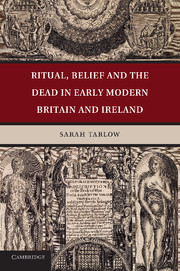Chapter 2 - Religious Belief
Published online by Cambridge University Press: 05 July 2014
Summary
The World of Late Catholicism
The sixteenth-century Protestant Reformation in Europe was the most significant change in the history of British attitudes towards the dead and the dead body in the last thousand years. Not only did a new liturgy transform totally the relationship between the living and the dead, a new totalising theology squeezed out quasi-superstitious practice from the bounds of what was officially tolerated. At the same time, a new geography of sacred space altered the landscape of the dead and the place of the living within it, and new strategies of identity creation and social negotiation were required in the aftermath of the radical political dislocations of the period.
This chapter looks at the dominant discourses about the dead body and its place in the new theologies of the sixteenth and seventeenth centuries. Other theological discourses about the human body followed different tracks: the discourse of denial of bodily appetites associated with Puritanism, for example, or the debates that considered the relationship between human and angelic bodies, or the nature of Christ's body. These other discourses, however, did not deal specifically with the dead body but discussed the meaning and value of the living body. Discussion of the dead body paid little or no attention to aspects of the body extensively discussed elsewhere, such as the relative qualities of male and female bodies or the theology of bodily practices such as consumption or sex. Modern analyses of early modern theories of the body have mostly paid more attention to gender, behaviour, adornment and clothing, and other features of the living body and the embodied experience, than to the material significance of the corpse and its relation to the dead person. Surprisingly for this period, the soul has not often been central to the historical analyses with which we are most familiar.
- Type
- Chapter
- Information
- Publisher: Cambridge University PressPrint publication year: 2010



